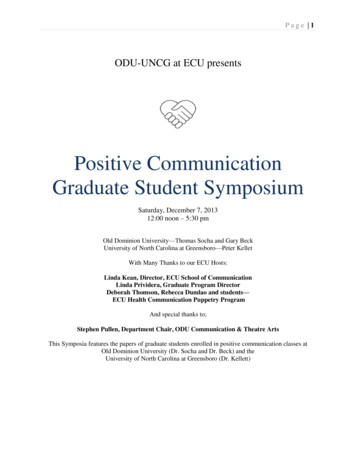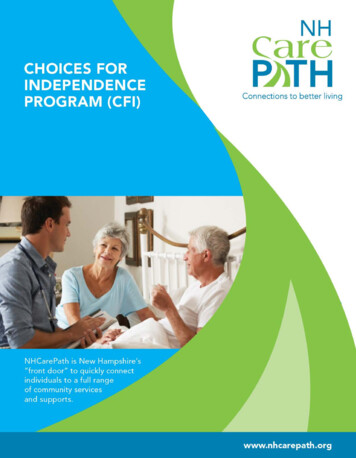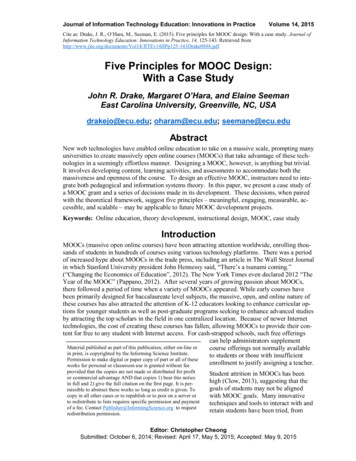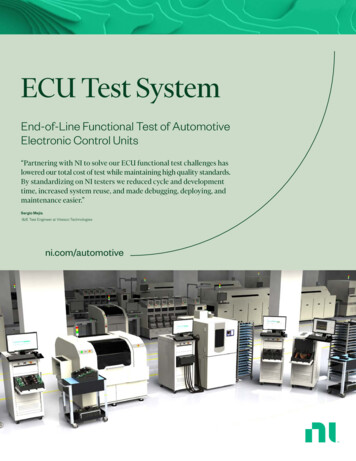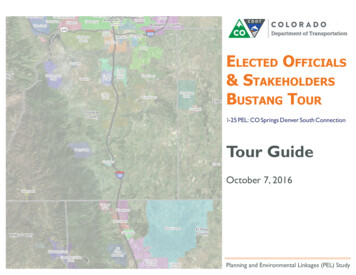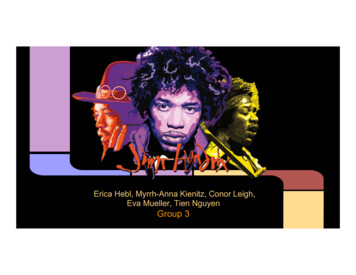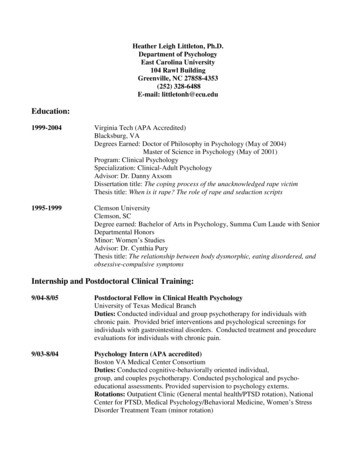
Transcription
Heather Leigh Littleton, Ph.D.Department of PsychologyEast Carolina University104 Rawl BuildingGreenville, NC 27858-4353(252) 328-6488E-mail: littletonh@ecu.eduEducation:1999-2004Virginia Tech (APA Accredited)Blacksburg, VADegrees Earned: Doctor of Philosophy in Psychology (May of 2004)Master of Science in Psychology (May of 2001)Program: Clinical PsychologySpecialization: Clinical-Adult PsychologyAdvisor: Dr. Danny AxsomDissertation title: The coping process of the unacknowledged rape victimThesis title: When is it rape? The role of rape and seduction scripts1995-1999Clemson UniversityClemson, SCDegree earned: Bachelor of Arts in Psychology, Summa Cum Laude with SeniorDepartmental HonorsMinor: Women’s StudiesAdvisor: Dr. Cynthia PuryThesis title: The relationship between body dysmorphic, eating disordered, andobsessive-compulsive symptomsInternship and Postdoctoral Clinical Training:9/04-8/05Postdoctoral Fellow in Clinical Health PsychologyUniversity of Texas Medical BranchDuties: Conducted individual and group psychotherapy for individuals withchronic pain. Provided brief interventions and psychological screenings forindividuals with gastrointestinal disorders. Conducted treatment and procedureevaluations for individuals with chronic pain.9/03-8/04Psychology Intern (APA accredited)Boston VA Medical Center ConsortiumDuties: Conducted cognitive-behaviorally oriented individual,group, and couples psychotherapy. Conducted psychological and psychoeducational assessments. Provided supervision to psychology externs.Rotations: Outpatient Clinic (General mental health/PTSD rotation), NationalCenter for PTSD, Medical Psychology/Behavioral Medicine, Women’s StressDisorder Treatment Team (minor rotation)
Heather L. Littleton pg. 2Professional Positions:10B08/12- presentAssociate Professor with TenureDepartment of PsychologyEast Carolina University8/08- 8/12Assistant Professor (tenure track)Department of PsychologyEast Carolina UniversityAdjunct Appointment: Department of Obstetrics and GynecologyB8/09- 7/128/06-7/08Assistant Professor (tenure track)Department of Psychology and PhilosophySam Houston State University9/04-7/06Women’s Health Research FellowCenter for Interdisciplinary Research in Women’s HealthUniversity of Texas Medical Branch1B2B3BProfessional Certifications/Licensure:6/09-presentNational Register of Health Service Psychologists5/09-presentNorth Carolina Psychology BoardLicensed PsychologistHealth Service Provider12/05-8/16Texas State Board of Psychological ExaminersLicensed Psychologist (Inactive)Post-Graduate Teaching t Professor/Associate ProfessorEast Carolina UniversityAdvanced Psychopathology (graduate level), 4 sectionsPsychotherapy Concepts and Techniques (graduate level), 7sectionsPsychology of Trauma (graduate level), 1 sectionSupervision Seminar (graduate level), 2 sectionsAbnormal Psychology (undergraduate level), 7 sectionsHonors seminar: Psychology of trauma (undergraduate level), 1 sectionUpper-level undergraduates and doctoral students
8/06- 8/08Courses:Recipients:7/05-6/06Recipients:Heather L. Littleton pg. 3Assistant ProfessorSam Houston State UniversityPsychology of Testing (undergraduate level), 1 sectionPsychopathology (graduate level), 3 sectionsUpper-level undergraduates and first year graduate studentsResident Lecturer for Adolescent GynecologyUniversity of Texas Medical Branch, Galveston, TXFirst year medical residents in Obstetrics and GynecologyFunded Grants:Evaluation of DVHPDI LAP Sites- ECU Subcontract (Site PI: Heidi Bonner), Role: Investigator. ECUSubcontract from the Department of Justice, 589,411, 1/1/2016-6/30/2018.Application of an information processing model to understanding rape victims’ post-assault adjustment,risk taking behavior, and re-victimization risk (PI: Heather Littleton). Grant seeking re-assignmentaward from Harriot College of Arts and Sciences, East Carolina University, 5000, 1/1/2015-5/30/2015.Evaluation of web-based CBT for rape victims (PI: Heather Littleton). R34 grant award from NIMH, 624,455, 12/1/2010-11/30/2014.Coping, adjustment, and resilience among college women following the mass shooting at Virginia Tech.SGER award from the National Science Foundation (co-PI: Heather Littleton, PI: Danny Axsom), 109,273, 6/15/2007-6/14/2009.Rape acknowledgment, recovery-related behaviors, and re-victimization risk: A longitudinal study (PI:Heather Littleton). Grant award from the Society for the Psychological Study of Social Issues, 2000,6/1/2006-5/30/2008.Grants in Progress:Integration of an online intervention for rape victims into college counseling centers: Determining thefeasibility, effectiveness, and treatment mechanisms. (Dual PIs: Heather Littleton, Amie Grills). R34revised grant application submitted to NIMH, 721,000, 6/15/2017.Evaluating teen dating violence prevention initiatives with LGBTQ youth: A three arm randomizedcontrol trial. (PI: Katie Edwards, Co-PI: Heather Littleton). Grant application submitted to NIJ, 1,000,000, 3/20/2017.The role of stigma in partner violence: A social psychological and ecological perspective. (PI: KatieEdwards, Co-PI: Heather Littleton). Revised grant application submitted to NSF, 1,045,902, 7/17/2017.An integrated social cognitive model of sexual victimization risk. (PI: Heather Littleton, Co-PI: AmieGrills, Co-PI: Alex Schoemann). Revised grant application to be submitted to NSF, 752,000,1/15/2018.
Heather L. Littleton pg. 4Clinical Supervision Experience:1/10-presentRecipients:Director of the Women’s Health Psychology Specialty ServiceDoctoral students in clinical health psychology1/09-presentClinical psychology practicum supervisorEast Carolina UniversityFirst year doctoral students in clinical health 8Recipients:Practicum II/III supervisorSam Houston State UniversityMasters students in clinical psychologyDoctoral practicum supervisor (PSY 883)Sam Houston State UniversityAdvanced clinical psychology doctoral studentsAwards and Recognition since ons:Harriot College of Arts and Sciences, Faculty Travel AwardPsychotherapy with Women Research Award, Division 35 (Psychology ofWomen) of the American Psychological Association, Honorable MentionRecipient of the Five Year Research Award for Excellence in Research andCreative Activity from East Carolina UniversityRecipient of the Georgia Babladelis Award for the best paper published inPsychology of Women QuarterlyNamed Fellow of Division 35 (Psychology of Women) of the AmericanPsychological AssociationNominated for APA Distinguished Contributions to Psychology in the PublicInterest Early Career Award by the Committee on Women in PsychologyDr. Eugene Hargrove Mental Health Research Award for Early Career Researchfrom the Psychiatric Foundation of North CarolinaBest papers published in the Journal of Trauma & Dissociation in 2010,Honorable MentionSelected to attend the American Psychological Association Advanced TrainingInstitute for Structural Equation Modeling for Longitudinal Research MethodsAmerican Psychological AssociationDiv. 35 Society for the Psychology of Women (Fellow)Div. 56 Trauma PsychologySociety of Behavioral MedicineInternational Society for Traumatic Stress Studies
Heather L. Littleton pg. 5Student Mentoring:2008 Amanda Amacker, “The relation between perceptions of similarity and blame to a victim ofsexual assault” Role: Thesis Chair, SHSU2008 Kimberly Bye, “Predictors of rape supportive attitudes: Examination in a multi-ethnic collegesample” Role: Thesis Chair, SHSU2008 Jennifer Vickery, “Body image and sexual risk taking: Moderators and mediators in auniversity population” Role: Thesis Chair, SHSU2008 Nicole Lozano, “Reactions to rape victims: The role of disclosure and empathy” Role: McNairscholar mentor, SHSU2009 Erika Canales, “Rape and seduction scripts of university men: Examination among non-coercive,coercive, and assaultive men” Role: Thesis Co-Chair, SHSU2009 Holly Tabernik, “Reactions to rape victims: Preliminary validation of a revised Social ReactionsQuestionnaire” Role: Thesis Co-Chair, SHSU2010 Jessica Tomasula, “Sexual trauma history and suicidality in youth” Role: Thesis Co-Chair, ECU2010 Sarah McCreight, “Online mental health services: Do women view this as a viable treatmentoption for sexual assault?” Role: Thesis Chair, ECU2011 Katherine Buck, “Women’s gender schemas for obstetricians-gynecologists” Role: Thesis Chair,ECU2013, Lindsey Rosman, “Body image and sexual functioning in breast cancer survivors” Role: ThesisChair, ECU2014, Jessica Ford, “Understanding trauma reactions in implantable cardioverter defibrillator patientsand piloting a brief web-based trauma intervention protocol study (ICD-TIPS)” Role: Dissertation CoChair, ECU2014, Katherine Buck, “Impact of educational messages on patient acceptance of male medicalstudents in ob-gyn encounters” Role: Dissertation Chair, ECU2015, Melissa Decker, “Predictors of sexual assault resistance self-efficacy and perceived risk of sexualassault among college women” Role: Thesis Chair, ECU2016, Julia Dodd, “Worldview as a predictor of health risk behavior following sexual victimization:Moderated mediation in an ethnically diverse community sample” Role: Dissertation Chair, ECU2016, Kelly Rudolph, “Sexual risk behaviors in college women: Perceived norms, sexual attitudes, andmotives” Role: Thesis Chair, ECUIn progress, Marlee Layh, “Sexual risk behavior and sexual functioning among African American andEuropean American victims of sexual assault” Role: Thesis Chair, ECUIn progress, Melissa Decker, “Minority stress, risky behaviors, and sexual scripting among transgendercollege students: A mixed methods study” Role: Dissertation Chair, ECUIn progress, Laura Haney, “Reactions to a sexual assault disclosure: Evaluation of an alternativescoring method for the Social Reactions Questionnaire” Role: Thesis Chair, ECUDepartmental and University Service2016-20172015-20162015-20172014-2015Chair, International Women’s Day, ECU Chancellor’s Committee on the Status ofWomenMember, Neuropsychology and Trauma Faculty Search CommitteeMember, ECU Chancellor’s Committee on the Status of WomenMember, ECU Committee on Sexual Misconduct Prevention
32012-20142011-20122011- eather L. Littleton pg. 6Primary Co-Chair, Psychology Department Personnel CommitteeChair, Psychology Department Scholarship CommitteePsychology Department Faculty Senate Representative AlternateMember, Director of Clinical Training Search CommitteeMember, Quantitative Psychology Faculty Search CommitteeMember, Personnel Committee, Department of PsychologyMember, Sexual Assault Issues Subcommittee, ECU Summer Read programMember, Doctoral Qualifying Exam CommitteeMember, Clinical Health Psychology Doctoral Admissions CommitteeMember, Psychology Department Scholarship CommitteeMember, Psychology Department Advisory CommitteeMember, Clinical Health Psychology Faculty CommitteeProfessional Service:2015-2017Member-at-large, Executive Committee, Division 56 (TraumaPsychology), American Psychological AssociationEditorial Board:Psychology of Women Quarterly (1/2016-present)Journal of Traumatic Stress (1/2014-present)Sex Roles (2/2011-12/2015)Society for the Psychology of Women Book Series (11/2013-present)Ad Hoc Reviewer (2011-present):American Journal of Obstetrics & GynecologyAnxiety, Stress, and CopingArchives of General PsychiatryBehavior TherapyBody ImageBritish Journal of Social PsychologyChild MaltreatmentClinical Psychology ReviewCognitive Therapy and ResearchCriminal Justice and BehaviorJournal of Clinical PsychologyJournal of Consulting and Clinical PsychologyJournal of Psychosomatic Obstetrics and GynecologyJournal of Social and Clinical PsychologyMayo Clinic ProceedingsPeerJPsychiatry and Clinical NeurosciencesPsychological Trauma: Theory, Research, Practice, and PolicyPsychology of ViolenceVictims and OffendersViolence Against WomenViolence and GenderViolence and VictimsWomen & Health
Heather L. Littleton pg. 7Community Presentations since 20104/1710/162/16; 2/176/154/153/1510/146/139/127/1212/1010/10Working with clients with chronic health conditions: The impact of psychologicaltrauma history. CE Workshop. Eastern Area Health Education Center, Greenville,NCTrauma and eating disorders. Presentation to D2 dental medicine students, EastCarolina UniversityPsychological trauma, PTSD, and the dental visit. Presentation to D1 dentalmedicine students, East Carolina UniversityCognitive behavioral interventions for trauma. CE Workshop. Eastern AreaHealth Education Center, Greenville, NCSexual assault re-victimization: Understanding risk factors for victims andperpetrators. Title IX Retreat, East Carolina UniversityFrom Survivor to Thriver: An online program for rape victims with PTSD.Gender to a Tea presentation, Women’s Studies, East Carolina UniversityThe From Survivor to Thriver Program: Initial results of an RCT for rape victims.Clinical Health Psychology Grand Rounds, East Carolina UniversityMaking progress on the problem of violence on college campuses. Center forResearch on Violence against Women, University of Kentucky.Sexual violence among women in the community. Obstetrics and GynecologyGrand Rounds, East Carolina UniversityAlcohol and sexual assault. Presentation as part of SART training for REALCrisis Intervention of Eastern Carolina.Addressing the mental health needs of reproductive-aged women. Residentdidactics presentation, Department of Obstetrics and Gynecology, East CarolinaUniversity.Post-trauma management: Lessons learned from the Virginia Tech tragedy.Clinical Psychology Grand Rounds, Department of Psychology, East CarolinaUniversity.Peer-Reviewed Journal Publications:1. Littleton, H. L., & Decker, M.* (in press). Predictors of resistance self-efficacy among rape victimsand association with re-victimization risk: A longitudinal study. Psychology of Violence.2. Littleton, H. L., Layh, M.*, & Rudolph, K.* (in press). Unacknowledged rape in the community:Rape characteristics and adjustment. Violence and Victims.3. Littleton, H. L., Grills, A. E., Layh, M.*, & Rudolph, K.* (in press). Unacknowledged rape and revictimization risk: Examination of potential mediators. Psychology of Women Quarterly.4. Lacks, M. H.*, Lamson, A. L., Rappleyea, D. L., Russoniello, C. V., & Littleton, H. (in press). Asystematic review of the biopsychosocial-spiritual health of active duty women. MilitaryPsychology.5. Decker, M.*, & Littleton, H. L. (in press). Sexual re-victimization among college women: A reviewthrough an ecological lens. Victims & Offenders.6. Dodd, J. C.*, & Littleton, H. L. (2017). Sexual assault and sexual risk behaviors among lowerincome rural women: The mediating role of self-worth. Violence and Victims, 32, 110-125.
Heather L. Littleton pg. 87. Littleton, H. L., & Dodd, J. C.* (2016). Violent attacks and damaged victims: The rapescripts of European American and African American U.S. college women. ViolenceAgainst Women, 22, 1725-1747.8. Edwards, K. M., Littleton, H. L., Sylaska, K. M., Crossman, A. L., & Craig, M. (2016). Collegecampus community readiness to address intimate partner violence among LGBTQ youngadults: A conceptual and empirical investigation. American Journal of Community Psychology,58, 16-26.9. Littleton, H. L., Grills, A. E., Schoemann, A., Drum, K., & Dodd, J. S.* (2016). From Survivor toThriver: Results of an RCT of a therapist-facilitated online intervention for rape victims.Journal of Anxiety Disorders, 43, 41-51.10. Buck, K. S.*, & Littleton, H. L. (2016). Impact of educational messages on patientacceptance of male medical students into ob-gyn encounters. Journal of PsychosomaticObstetrics and Gynecology, 37, 84-90.11. Mancini, A., Littleton, H. L., & Grills, A. E. (2016). Can people benefit from acute stress? Socialsupport, psychological improvement, and resilience after the Virginia Tech campus shootings.Clinical Psychological Science, 4, 401-417.12. Littleton, H. L. (2015). Sexual victimization and somatic complaints in pregnancy: Examinationof depression as a mediator. Women’s Health Issues, 25, 696-702.13. Littleton, H. L., Grills-Taquechel, A. E., & Drum, K. B. (2014). Predicting risky sexualbehavior in emerging adulthood: Examination of a moderated mediation model among childsexual abuse and adult sexual assault victims. Violence and Victims, 29, 981-998.14. Drum, K. B., & Littleton, H. L. (2014). Therapeutic boundaries in telepsychology: Uniqueissues and best practice recommendations. Professional Psychology: Research and Practice, 45,309-315.15. Littleton, H. L. (2014). Interpersonal violence on college campuses: Understanding riskfactors and working to find solutions. Trauma, Violence, & Abuse: A Review Journal. 15,297-303.16. Buck, K. S.*, & Littleton, H. L. (2014). Stereotyped beliefs about male and female OBGYNs: Relationship to provider choice and patient satisfaction. Journal of PsychosomaticObstetrics & Gynecology, 35, 1-7.17. Amacker, A.*, & Littleton, H. L. (2013). Perceptions of similarity and responsibilityattributions to an acquaintance sexual assault victim. Violence Against Women, 19, 1384-1407.18. Littleton, H. L., & Ullman, S. E. (2013). PTSD symptomatology and hazardous drinkingas risk factors for sexual assault re-victimization: Examination in European Americanand African American women. Journal of Traumatic Stress, 26, 1-9.19. Littleton, H. L., Grills-Taquechel, A. E., Buck, K. S.*, Rosman, L.*, & Dodd, J. C.* (2013).Health risk behavior and sexual assault among ethnically diverse women. Psychology ofWomen Quarterly, 37, 7-21.20. Littleton, H. L., Grills-Taquechel, A. E., Axsom, D., Bye, K.*, & Buck, K. S.* (2012).Prior sexual trauma and adjustment following the Virginia Tech campus shootings: Examinationof the mediating role of schemas and social support. Psychological Trauma: Theory, Research,Practice, and Policy, 4, 578-586.
Heather L. Littleton pg. 921. Tomasula, J. L.*, Anderson, L. M., Littleton, H. L., & Riley-Tillman, T. C. (2012). Theassociation between sexual assault and suicidal activity in a national sample. SchoolPsychology Quarterly, 27, 109-119.22. Littleton, H. L., Buck, K. S.*, Rosman, L.*, & Grills-Taquechel, A. E. (2012). The FromSurvivor to Thriver Program: A pilot study of an online program for rape victims. Cognitive andBehavioral Practice, 19, 315-327.23. Littleton, H. L., & Grills-Taquechel, A. E. (2011). Evaluation of an information processingmodel following sexual assault. Psychological Trauma: Theory, Research, Practice, andPolicy, 3, 421-429.24. Littleton, H. L. (2011). Rape myths and beyond: A commentary on Edwards andcolleagues (2011). Sex Roles, 65, 792-797.25. Luca, M., Giannini, M., Gori, A., & Littleton, H. L. (2011). Measuring dysmorphicconcern in Italy: Psychometric properties of the Italian Body Image Concern Inventory (I-BICI).Body Image, 8, 301-305.26. Littleton, H. L., Kumpala, M.*, & Orcutt, H. (2011). Posttraumatic symptoms following acampus shooting: The role of psychosocial resource loss. Violence and Victims, 26, 461476.27. Grills-Taquechel, A. E., Littleton, H. L., & Axsom, D. (2011). Social support, worldassumptions, and exposure as predictors of anxiety and quality of life following a mass trauma.Journal of Anxiety Disorders, 25, 498-506.28. Littleton, H. L., Axsom, D., & Grills-Taquechel, A. E. (2011). Longitudinal evaluation ofthe relationship between maladaptive trauma coping and distress: Examination following themass shooting at Virginia Tech. Anxiety, Stress, and Coping, 24, 273-290.29. Littleton, H. L., Bye, K. S.*, Buck, K.*, & Amacker, A.* (2010). Psychosocial stress duringpregnancy and perinatal outcomes: A meta-analytic review. Journal of PsychosomaticObstetrics and Gynecology, 31, 219-228.30. Littleton, H. L. (2010). The impact of social support and negative disclosure reactions onsexual assault victims: A cross-sectional and longitudinal investigation. Journal of Trauma andDissociation, 11, 210-227.31. Littleton, H. L., Axsom, D., & Grills-Taquechel, A. E. (2009). Adjustment following themass shooting at Virginia Tech: The roles of resource loss and gain. Psychological Trauma:Theory, Research, Practice, and Policy, 1, 206-219.32. Littleton, H. L., Grills-Taquechel, A. E., & Axsom, D. (2009). Resource loss as a predictorof posttrauma symptoms among college women following the mass shooting at Virginia Tech.Violence and Victims, 24, 669-687.33. Littleton, H. L., Grills-Taquechel, A. E., & Axsom, D. (2009). Impaired and incapacitatedrape victims: Assault characteristics and post-assault experiences. Violence and Victims, 24, 439457.34. Littleton, H. L., Tabernik, H.*, Canales, E. J.*, & Backstrom, T.* (2009). Risky situation orharmless fun? A qualitative examination of college women’s bad hook-up and rape scripts. SexRoles, 60, 793-804.35. Littleton, H. L., Axsom, D., & Grills-Taquechel, A. (2009). Sexual assault victims’acknowledgment status and re-victimization risk. Psychology of Women Quarterly, 33, 34-42.36. Littleton, H. L., & Henderson, C. E. (2009). If she is not a victim, does that mean she wasnot traumatized? Evaluation of predictors of PTSD symptomatology among college rapevictims. Violence Against Women, 15, 148-167.
Heather L. Littleton pg. 1037. Littleton, H. L., & Radecki Breitkopf, C. (2008). The Body Image Concern Inventory:Validation in a multiethnic sample and initial development of a Spanish language version. BodyImage, 5, 381-388.38. Littleton, H. L., Radecki Breitkopf, C., & Berenson, A. B. (2008). Beyond the campus:Unacknowledged rape among low income women. Violence Against Women, 14, 269-286.39. Littleton, H. L., Horsley, S.*, John, S.*, & Nelson, D. V. (2007). Trauma coping strategiesand psychological distress: A meta-analysis. Journal of Traumatic Stress, 20, 977-988.40. Littleton, H. L., Radecki Breitkopf, C., & Berenson, A. B. (2007). Sexual and physicalabuse history and recent sexual risk behaviors: Relationships among women and potentialmediators. Child Abuse & Neglect, 31, 757-768.41. Littleton, H. L. (2007). An evaluation of the coping patterns of rape victims: Integrationwith a schema-based information processing model. Violence Against Women, 13, 789-801.42. Littleton, H. L., Rhatigan, D., & Axsom, D. (2007). Unacknowledged rape: How much dowe know about the hidden sexual assault victim? Journal of Aggression, Maltreatment,and Trauma. 14 (4), 57-74.43. Littleton, H. L., Berenson, A. B., & Radecki Breitkopf, C. (2007). An evaluation of healthcare providers’ sexual violence screening practices. American Journal of Obstetrics &Gynecology, 196, 564.e1-564.e7.44. Littleton, H. L., Radecki Breitkopf, C., & Berenson, A. B. (2007). Correlates of anxietysymptoms during pregnancy and association with perinatal outcomes: A meta-analysis.American Journal of Obstetrics & Gynecology, 196, 424-432.45. Littleton, H. L., Radecki Breitkopf, C., & Berenson, A. B. (2007). The rape scripts of lowincome European American and Latina women. Sex Roles, 56, 509-516.46. Radecki Breitkopf, C., Littleton, H. L., & Berenson, A. B. (2007). Body image: Astudy in a tri-ethnic sample of low income women. Sex Roles, 56, 373-380.47. Littleton, H. L., Tiedeman, K., & Axsom, D. (2007). A meta-analysis of self-attributionsfollowing three types of trauma: Sexual victimization, illness, and injury. Journal of AppliedSocial Psychology, 37, 515-538.48. Littleton, H. L., Axsom, D., & Yoder, M. (2006). Priming of consensual and non-consensualsexual scripts: An experimental test of the role of scripts in rape attributions. Sex Roles,54, 557-563.49. Littleton, H. L., Axsom, D., Radecki Breitkopf, C., & Berenson, A. B. (2006). Rapeacknowledgment and post assault behaviors: How acknowledgment status relates todisclosure, coping, worldview, and reactions received from others. Violence and Victims,21, 765-782.50. Littleton, H. L., & Radecki Breitkopf, C. (2006). Coping with the experience of rape.Psychology of Women Quarterly, 30, 106-116.51. Littleton, H. L., Radecki Breitkopf, C., & Berenson, A. B. (2005). Body image and riskysexual behaviors: An investigation in a tri-ethnic sample. Body Image, 2, 193-198.52. Littleton, H. L., Axsom, D., & Pury, C. L. S. (2005). Development of the Body Image ConcernInventory. Behaviour Research and Therapy, 43, 229-241.53. Littleton, H. L., & Axsom, D. (2003). The rape and seduction scripts of university students:Implications for rape attributions and unacknowledged rape. Sex Roles, 49, 465-475.54. Littleton, H. L., & Ollendick, T. (2003). Negative body image and disordered eating: What placesyouth at risk and how can these problems be prevented? Clinical Child and Family PsychologyReview, 6, 51-66.
Heather L. Littleton pg. 11Works in Progress:Ford, J., Sears, S., Littleton, H. L., Lutes, L., Wuensch, K., Benton, C., Cahill, J., Hudson, C.,Nekkanti, R., & Gehi, A. Implantable Cardioverter Defibrillator Trauma Intervention Protocol(ICD-TIPs): Pilot evaluation of a brief, web-based treatment for ICD patients with posttraumaticstress. Manuscript in preparation.Dodd, J., & Littleton, H. Self-worth, depression, and hazardous drinking: Self-medication and sexualvictimization. Manuscript in preparationResearch Presentations at Professional Conferences:1. Rudolph, K.*, & Littleton, H. (2017, August). Sexual risk behavior in college women: A test of acombined peer influence and sexual motive model. Paper presented at the annual meeting ofthe American Psychological Association, Washington, DC.2. Layh, M.*, & Littleton, H. (2017, August). Sexual risk behaviors, sexual satisfaction, and sexualfunctioning among rape survivors and non-victims. In C. Bowman (Chair), Predictors of andoutcomes related to sexual violence: Implications for prevention. Symposium conducted at theannual meeting of the American Psychological Association, Washington, DC.3. Littleton, H., Layh, M.*, Rudolph, K.*, & Haney, L.* (2017, August). Evaluation of the SES-R as asexual assault screening measure. In L. Jones (Chair), New frontiers in measurement andvictimization and Rrsilience. Symposium conducted at the annual meeting of the AmericanPsychological Association, Washington, DC.4. Sharp, M.*, Decker, M.*, Littleton, H., & Dolbier, C. (2017, March). Interpersonal violence historyand childbirth specific posttraumatic stress symptoms. Paper presented at the annual meeting ofthe Society of Behavioral Medicine, San Diego, CA.5. Littleton, H., Layh, M.*, Decker, M.*, & Grills, A. (2016, November). Pre-treatment difficulties andresources as predictors of therapist working alliance in online PTSD treatment. In C. Yeager(Chair), Theoretical predictors of the effectiveness of Web interventions for trauma. Symposiumconducted at the annual meeting of the International Society for Traumatic Stress Studies,Dallas, TX.6. Littleton, H. (2016, November). Predictors of adjustment following gun violence: Lessons learnedfrom a study of victims of the Virginia Tech campus shooting. In J. Kenardy (Chair), Gunviolence and its impact on society. Symposium conducted at the annual meeting of theInternational Society for Traumatic Stress Studies, Dallas, TX.7. Littleton, H. (2016, May). Unacknowledged rape among rural low SES African American andEuropean American women. In L. Wilson (Chair), Unacknowledged rape: What do we knowabout survivors who do not acknowledge their experience? Symposium conducted at the annualmeeting of the Association for Psychological Science, Chicago, IL.8. Layh, M.*, Rudolph, K.*, & Littleton, H. (2016, May). Rape acknowledgment, sexual risk behavior,and re-victimization risk. In L. Wilson (Chair), Unacknowledged rape: What do we know aboutsurvivors who do not acknowledge their experience? Symposium conducted at the annualmeeting of the Association for Psychological Science, Chicago, IL.
Heather L. Littleton pg. 129. Decker, M.*, & Littleton, H. L. (2015, November). Does depression increase threat of sexual revictimization among survivors? Risk perception and resistance self-efficacy as mechanisms.Paper presented at the annual meeting of the International Society for Traumatic StressStudies, New Orleans, LA.10. Dodd, J. C.*, & Littleton, H. L. (2015, November). Worldview as a predictor of health riskbehavior following sexual victimization: Moderated mediation in an ethnically diversecommunity sample. Paper presented at the annual meeting of the International Society forTraumatic Stress Studies, New Orleans, LA.11. Littleton, H. L., & Grills, A. E. (2015, August). The From Survivor to Thriver program: AnRCT of an online cognitive-behavioral program for rape-related PTSD. In H. L. Littleton(Chair), Promises and pitfalls of online interventions for traumatized individuals: Results ofempirical evaluations and boundary issues for clinicians. Symposium conducted at the annualmeeting of the American Psychological Association, Toronto, Canada.12. Buck, K. S.*, & Littleton, H. L. (2015, February). Impact of educational messages on patientacceptance of male medical students in OB-GYN. Paper presented at the annual meeting of theAssociation of Psychologists in Academic Health Centers, Atlanta, GA.13. Dodd, J.*, Decker, M.*, & Littleton, H. L. (2014, November). Resistance self-efficacy as apredictor of re-victimization among sexual assault victims. Paper presented at the annual meetingof the International Society for Traumatic Stress Studies, Miami, FL.14. Littleton, H. L. (2014, November). Sexual victimization and alcohol use and somatic symptoms inpregnancy: The mediating role of depressive symptoms. Paper presented at the annual meeting ofthe International Society for Traumatic Stress Studies, Miami, FL.15. Quintero, J.*, & Littleton, H. L. (2014, April). Comparing the rape scripts of hazardous drinkingand non-hazardous drinking college women. Paper pr
Heather L. Littleton pg. 5 Student Mentoring: 2008 Amanda Amacker, "The relation between perceptions of similarity and blame to a victim of sexual assault" Role: Thesis Chair, SHSU 2008 Kimberly Bye, "Predictors of rape supportive attitudes: Examination in a multi-ethnic college sample" Role: Thesis Chair, SHSU 2008 Jennifer Vickery, "Body image and sexual risk taking: Moderators and .
